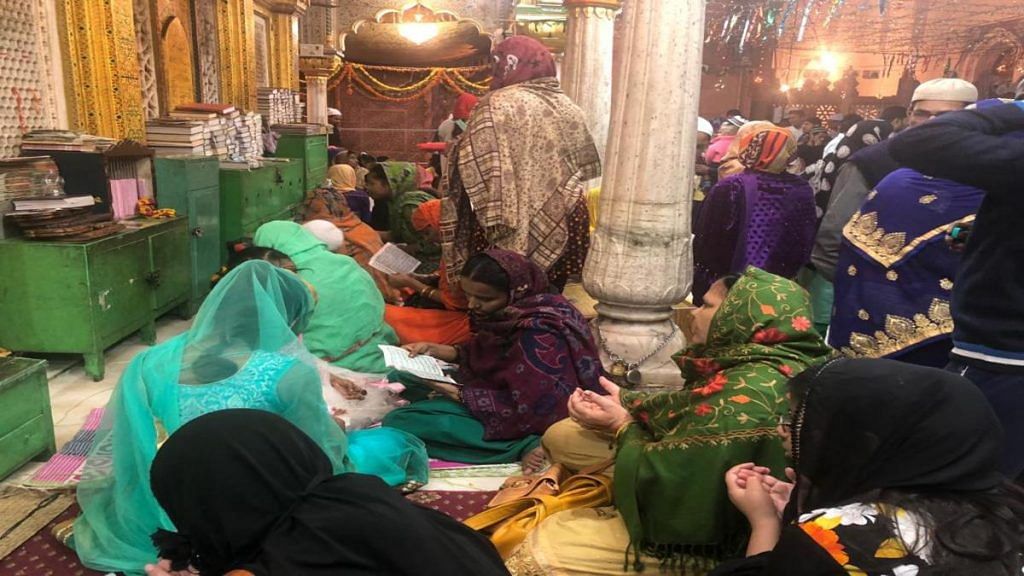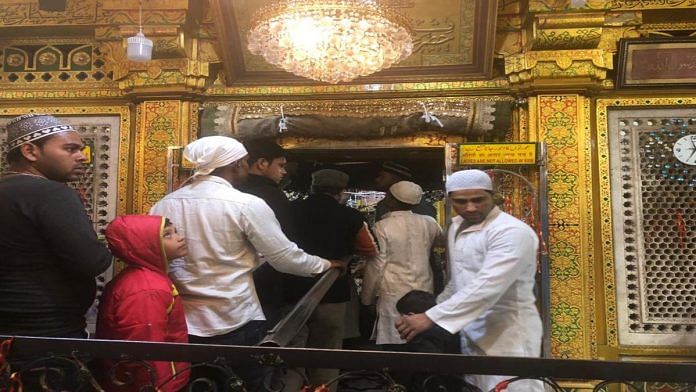Three women law students have cited the Ajmer Sharif dargah as an example of the bar having no basis in Islamic scripture.
New Delhi: Protests are still on against the Supreme Court’s order to allow women inside the sanctum sanctorum of Kerala’s Sabarimala Temple, but similar restrictions at other places of worship are already being challenged.
A new petition in the Delhi High Court has sought the entry of women into the sanctum sanctorum of the Hazrat Nizamuddin Auliya Dargah in Delhi.
Filed by three women law students, the plea takes exception to a notice pasted on the premises that bars women from the main shrine of the renowned dargah, otherwise known for its unique character of embracement and transcendence across religious and caste lines.
While men and transgenders are allowed inside the south Delhi shrine, women have to pray, kneel and kiss the wall behind the grave of the Sufi saint.

“These three law students had come to Delhi and visited the dargah,” advocate Kamlesh Mishra, their lawyer, said. “There, they saw this notice that barred women from entering it, so they approached me and asked if it could be challenged, and I said, of course, it can be.”
The students first made a representation to the government as well as the Nizamuddin dargah trust in late November. When it was not responded to, they moved the Delhi High Court.
“The dargah is a public place,” said Mishra, “Any kind of ban on anyone’s entry there is simply unconstitutional, and therefore we have challenged it.”
The petition will be heard in the court Monday.
Also Read: If Supreme Court has to intervene at Sabarimala, it must do so for all religions
Why the ban exists
The 45-page petition cites a 2016 report by ThePrint, according to which women are not allowed to enter the sanctum sanctorum of the dargah, where Hazrat Nizamuddin Auliya rests, because it is believed the dead can see women naked if they go too close.
In 2016, when protests seeking the entry of women in the sanctum of the Shani Shingnapur temple at Ahmednagar, Maharashtra, and Mumbai’s Haji Ali Dargah were at their peak, Syed Kalim Nizami, who belongs to Nizamuddin Auliya’s lineage and is among those who manage the shrine, had told ThePrint that women were also barred from visiting graves for the same reason.
“In Islam, women are not supposed to go too close to graves,” Nizami had said. “It is not just in the dargahs. Women cannot go to graveyards in general.”
Moreover, since this has been the tradition at the dargah for 700 years, it must be preserved, he had said.
Quoting from the report, the petition says: “When it comes to religion, logic has never been a strong point. But this is far-fetched even by religious standards.
“Deeply reflective of how religion can never harbour sound reasoning, this absurd statement is just a drop in the ocean of the ridiculous things divine middlemen have spewed on us unsuspecting souls.”
Also Read: Not just a bar at Sabarimala, menstruation has got women ostracised & labelled witches
Not true for all dargahs
The argument made by Nizami was countered by Alhaj Syed Nayeemuddin Niazi, a khadim at the Ajmer Sharif Dargah, where there are no restrictions on women.
Niazi had said the argument was not present in Islamic scripture. “Throughout their lifetimes, they (Sufi saints) used to interact with women and heal them. Why can they not do so after death?” he asked.
Quoting Niazi, the petition adds: “Coming from a manager of another prominent religious shrine, it is quite clear that the rules aren’t set in stone and are completely arbitrary.”
Zakia Soman, the founder of the Bharatiya Muslim Mahila Aandolan, who had moved the Bombay High Court to seek the entry of women inside the iconic Haji Ali Dargah, agreed.
“There are so many lesser-known dargahs where women go right up to the sanctum sanctorum, but the famous dargahs also have powerful trusts, so they get away with their retrograde and patriarchal diktats, which have no grounding in Islam,” she added.
In 2016, the Bombay High Court had ruled in favour of women’s entry into the sanctum sanctorum of Haji Ali Dargah, which was allowed earlier before being arbitrarily ended in 2012.
A similar verdict by the same court had led to women being allowed into the sanctum sanctorum of the Shani Shingnapur temple too.
“Since a similar judgment already exists, the Delhi High Court can easily rule in favour of women,” Soman said.
Also Read: Gods are male, they hate women: Why fighting for entry to temples is futile




WOW! I didn’t know that OUR INDIA’S LADIES are soooo EROTIC and UNCONTROLLABLY S-E-X-Y (!) ; that they dare NOT approach the graves of dead MEN! Mahilaen Zindabad!
They shouldn’t go to open casket funerals in churches; Hindu and Sikh cremations; or any other funerals for men; lest the DEAD MEN see them “naked,” and wake up with a MASSIVE GODDAMN BONER!!!
This is so HILARIOUS!!! SOME OF OUR INDIA’S MEN have become so S-I-C-K! It’s unbelievable! Are you all kidding me?
The citadel has been breached, it is just a matter of time before the few remaining restrictions fall away. Next, although this is a matter of personal choice, should be the burqa. A modest head scarf should suffice for the more conservative.